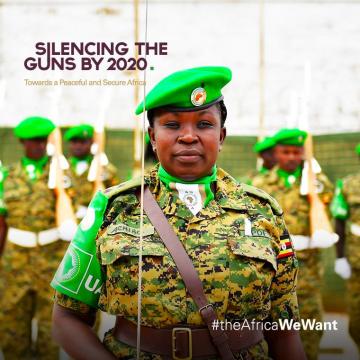
Guns Are Not Silent in Africa …Yet
The African Union (AU) anticipated guns to be silent in Africa by 2020, as part of Agenda 2063, however, with more than 35 conflicts at the moment, the guns are not silent yet in many communities of the continent and the impact on people’s welfare and development is huge.



In thinking about silencing guns, we need to think about preventing and solving conflict. It is important to think about current conflict areas and resolve them. Some major conflict on the continent are in these countries:
- Niger
- Sudan
- Boko Haram in Nigeria and insurgency in other parts of West Africa, including Burkina Faso, Mali, Chad and Niger in Mali
- The Mozambique conflict in Cabo Delgado
- Democratic Republic of Congo conflicts
- Central African Republic (CAR)
- Military occupation of Western Sahara by Morocco since 1975
- South Sudan
- Ethiopia
- Cameroon
- Senegal
- Somalia

Preventing conflict in Africa – 8 Key strategies
- 1. Land justice
- 2. Political justice
- 3. Better management of resources
- 4. Rural development
- 5. Income, empowerment and employment opportunities
- 6. Stronger institutions to prevent conflict
- 7. Remove colonial arrangements that still exploit Africa
- 8. A uniting, African-centred, people-centred leadership
A focus on land injustice
In many African communities, land imbalance exists mainly as a result of colonisation but also marginalisation and inequality. Fight over land injustice in South Africa, Namibia, Mozambique, Angola and other countries, mainly as a result of land colonisation and dispossession has been going on for a long time. A key solution is land return which has worked in Zimbabwe. Land justice and land return includes:
- Land in the hands of white people that was forcibly taken from black people, and sold or inherited
- Land taken from black people by black people, including land taken by governments, churches and companies without consent or replacement.
Land is far more than an asset for economic production, it is social capital where houses, homes, villages, Chiefdoms and Kingdoms reside. Land is citizenship, it is belonging. It is being human. It is identity, it is continuity.
A focus on youths and the challenge of inappropriate education
Since independence from colonial rule, countries in Africa improved their education, including primary, secondary and tertiary education. This resulted in more skilled people, however, the focus was not equally put on creating jobs. Another gap the remained was not making the education suitable to the situation in Africa, where more productive capacity is required. Instead, universities trained professionals when the work is not adequately there. Training required is to ensure economic productivity, not training for degrees. In Africa, you find several universities training marketers and managers where there are no products to market – what is required are more farmers, miners, industrialists, entrepreneurs, developers and processors. The same challenge is seen in social work, where training focuses on office workers who manage welfare yet the welfare is inadequate – a solution is developmental social work. The result of theoretical education has been catastrophic in most countries, with young educated people fighting for very little collar and tie job opportunities that are available. This has also resulted in migration outside countries (formal or informal) , and the continent, in itself a sad loss to Africa. This is because of the resulting effects of energy-drain, social-drain and brain-drain. If not resolved, more young people will continue to leave the continent and villages and suburbs will remain without the energy, brains and social skills required for development. A sad outcome would be accelerated violence which could ultimately grow into military violence, as young people fight political systems that they see as unjust.
In conclusion
Silencing guns is achievable, it involves dealing with present conflict and more importantly deal with potential conflict areas. The potential conflict areas are political (as the current one in Niger), over land theft (the case of South Africa and Namibia) and over youth empowerment (several countries). A common theme in these conflicts is socioeconomic challenges. Above all, Ubuntu-centred justice should ground all approaches to conflict, and silence guns in Africa.
Social work and development can contribute to ending conflicts in several ways, including these three: (1) revising curricula to make their training more focused on income creation; (2) advocating for just policies, politics and resource distribution, including land; and (3) advancing decolonisation, including decolonisation of primary, secondary and university education.
Use the form below to subscibe to Owia Bulletin.
Discover more from Africa Social Work & Development Network | Mtandao waKazi zaJamii naMaendeleo waAfrika
Subscribe to get the latest posts sent to your email.




You must be logged in to post a comment.